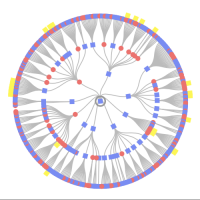Why are there so few batches to choose from
Why is everything Ireland? Can't we get some birth, death, and marriage records in America?
Best Answer
-
Hi @samshicat ,
While we all will hopefully be building our own portions of the Family Tree, I was referring to adding people that we index (or do the computer review) to Family Tree, and working on building their families out on the tree (expanding them).
It's very important when adding an unconnected person, however, to do our own checking to make certain (to the best of our ability) that we are not adding a duplicate person into the tree, which can add to the confusion we've all seen (or will eventually see) with incomplete, confusing, and sometimes even erroneous connections being made between people on the tree (wrong parents, wrong children, etc.). But a little bit of diligence in researching the names we find will bring blessings to everyone searching for their own ancestral family. Hopefully names will not just be "automatically" added to the Family Tree in FamilySearch without checks to see if they already exist. And sometimes that takes a bit of effort, because as good as the FamilySearch computers are at identifying people already in the tree, duplicates can and will exist without showing up when we check for them (due to name spelling variations and other factors).
Not long ago I decided to check to see if by any chance anyone had added more information about my earliest known Bienemann ancestor. Bieneman is my birth name, whereas Schmink is just my name due to an adoption late in my childhood. I was wonderfully surprised that my tree had suddenly been extended from the late 1700s back to 1660 with three more generations, thanks to others' contributed research! And the most thrilling part of it was that my now-earliest known ancestor's name (Christoph Bieneman) is the German equivalent of my own birth name (Christopher Bieneman). Everyone deserves that thrill!😁
Hope that helps.
--Chris
1
Answers
-
There are many US records currently available for indexing, including marriages from Illinois and vital records from Virginia.
2 -
Why? From observation - the process to create an indexing Project is involved and scheduled. The schedule just happens to be this way now?
2 -
The Illinois records were completed in a few days. The Virginia records are to0 difficult for many to read. Ireland has monopolized the records for over a year. I am in NC and I would love to do some NC records.
1 -
It's not "Ireland monopolized" - FamilySearch decides which records to index based on what contracts they have with the record holders.
1 -
There is also New York mortgage projects. They are pretty straight forward and not that difficult. If you don't like what's available, keep checking until something pique's your interest
1 -
What about UK England projects ? there have been none whatsoever for months !
1 -
We have a lot of beginners in our stake and all batches available are intermediate or higher. Plus lately, there are only a few things to choose from whereas before they were tons of different batches to pick from.
0 -
Currently there are 30 indexing projects, all intermediate or higher. The beginner projects go fast!
1 -
I've noticed that projects I don't consider very difficult are marked intermediate or higher.
0 -
One project that was initially a Beginner project came back with the next group of batches as Intermediate. I'm guessing this happened because of the number of corrections that were made to the first batch because indexers didn't read the instructions and look at the sample (the project only uses one form so far). The same thing is happening again at the Intermediate level, for the same reason.
As a reviewer, it seems that's all I've been doing lately, is correcting project instruction errors.
3 -
Please put up more birth, death, and marriage records in the USA
0 -
Perhaps the stake could hold a Zoom meeting for indexing participants, screen share, demonstrate how it is done correctly, and help these beginners do good work. Then they would be safe let loose on "intermediate" records.
3 -
Even better would be if FamilySearch provided a tutorial video when indexers sign up showing how to use the indexing program (e.g., finding batches, difficulty levels, project instructions, field helps, adding/deleting entrie, returning batches, menu options, etc.) instead of just having that simple one-entry intro that is there.
When I signed up, I was like, "This is all the instruction I get?" Needless to say, I made many mistakes because I didn't know where to look for the answers! At that time, I didn't know about this Community. After watching a few indexing videos (mentioned in other posts), I found a lot of tips to make using the program easier to use and indexing/reviewing quicker.
2 -
I agree. It is important to keep the written instructions posted, but having something visual seems to make a greater impact on your brain so that you have a clearer understanding of how the project should be indexed.
1 -
In my opinion the level of difficulty does not apply. For example: Virginia - some of them are very difficult to read and others are typed and very easy to index. But I definitely agree -- WE WANT MORE USA BIRTH, DEATH AND MARRIAGE RECORDS! Ireland has monopolized indexing for over a year. GIVE US SOMETHING WE ENJOY INDEXING!
0 -
Ireland is not doing the monopolizing. FamilySearch creates indexing projects from what records are available. In many cases, US records are held so tightly by the original record creator, that FS does not have the rights to offer them for indexing.
4 -
I too am distressed that there are rarely beginning batches. I expect that is what was meant when saying there were only a few available and previously a lot to pick from. But, just a thought, make sure you have checked all the boxes ( beginning, intermediate, advanced) when searching for a batch. I made the mistake of not clicking all the boxes and wondered why I did not have more to choose from.
Just a thought.
And I also would like to see a broader range of places.
0 -
There are less and less batch choices in English in the United States. It looks like indexing in the US is coming to an end.
0 -
I have no insider info. I wonder if there are few new projects because we are approaching the end of the year. We may see new/different projects in the new year.
Even in an organization where much is done by volunteers, there are annual budgets and budget limitations.
0 -
I'm starting to wonder if it's because it's 5-ish weeks away from the new year. The Cook County records went in, what, 4 days, including reviewing? The Boston Tax Records have been gone for a few days, maybe a week now.
I'd love to see more WWII-related projects in 2023, but that's probably wishful thinking (hey, a girl can dream, right?).
0 -
It also may be because more resources are working on preparing for the upcoming RootsTech.
0 -
We don't see any beginner projects and the projects we do have are much less than in years past. Plus, why was indexing/reviewing the 1950 census for only a short period of time--and then it wasn't done 100%? Were we only teaching computers how to read handwriting and one day they'll take over doing indexing/reviewing? We're losing the interest of our indexers and submissions have dropped a lot which saddens me. Many thanks for whatever you can share on this.
0 -
I think the message I received when they closed 1950 Census reviewing said they had gotten enough input from the indexers for the parts the computer needed to take over - so yes, I think we were training the computer to complete the Project.
I don't know how far computer/AI will take over indexing - but it will sure speed up the process - which is sort of a good thing if it does a good job. I am sure the new process of editing the indexed records will be needed to correct errors.
Indexers can retrain as Tree researchers - there is always something needing done. They can take all the knowledge they gained about records from Indexing and put that to good use attaching them in the Tree to profiles they belong.
3 -
Thank you so much for your response. AI certainly will speed up the process, especially since the younger generations cannot read cursive and a lot of the images are just that. Some youth couldn't even read the printed handwriting. Thank you again!
1 -
1
-
Thank you! I'll pass on the info to our stake members! 😍
0 -
@erutherford I loved doing WW II and even WW I batches also. Unfortunately, I think they have all been done. I'm guessing most of the available records for the church to index are being done by other indexing groups for paid genealogy websites. We use to have many newspaper obituaries to do from different states and newspapers a few years ago. Now, there are several giant Newspaper sites that give access for $$. There are none to do on FS. Sad. I liked doing those also. I think Privacy issues have also become a roadblock to releasing public or private information online. A third reason is that there are so many more volunteers trying to do indexing on FS that there were 10 years ago. So projects go quickly when there are beginner level batches.
0 -
You just have to keep checking back. A U.S. beginner's project became available today and all 12,000 entries got checked out to be indexed. If you are able to review, that is still available.
1 -
@MinnWisRoots Oh, I was only agreeing with eutherford about loving to do WW draft records. I usually only review Advanced projects but when I started indexing 8 years ago there would sometimes be 40-70 projects to be done and half would be Beginning. I learned after a couple years that if I wanted to continue indexing I would have to teach myself extra skills like reading 16th-17th century English handwriting or Dutch records or Philippine or Micronesian records. It can be done with lots of effort but is very rewarding as you probably know. But there are many more indexers now and a darth of beginning records.
0 -
@samshicat Don't forget to look at some of the Intermediate projects. There are several as of today that are both Beginner and Intermediate, including some rather easy typewritten ones!
As for computers taking over, that's far better than what we've had to do for so many decades with human beings doing both the first batch indexing as well as the reviewing for accuracy. The combined cooperative efforts of FamilySearch and Ancestry.com to get the 1950 U.S. Census done in record time, including ALL columns this time, was incredible! They did not roll out the computer programs for use until they had an accuracy record approximately equal to the accuracy that human beings have provided in past indexing projects.
While FamilySearch has access to computers with that level of accuracy, it was decided that the Ancestry.com computers would do the first pass, and then FamilySearch would recruit the human beings to do the 2nd pass (to correct the relatively few mistakes). The level of accuracy I found with the batches I did was quite impressive. Plus I got the chance (privilege!) to review my parents and myself in the 1950 Census, and the only corrections for all three of us were that my parents' each had an error in their middle initials - totally understandable because of what the Census taker wrote on paper. Some human indexers might have made those same mistakes.
I fully endorse the comment by @genthusiast concerning indexers transitioning to tree-building, though the need for humans to continue reviewing the computerized first pass will continue to exist for some time to come. The whole purpose of the Family Tree in FamilySearch is to build out the human family tree as accurately and as completely as possible - and as quickly as possible. The more people on the tree, the better the chances of new FamilySearch users finding considerable family information already on the tree as soon as they add their first deceased ancestors to the tree. Everyone should have that thrill of having multiple generations suddenly pop up after simply adding just one more person (deceased) to their part of Family Tree. 😁
--Chris
1





